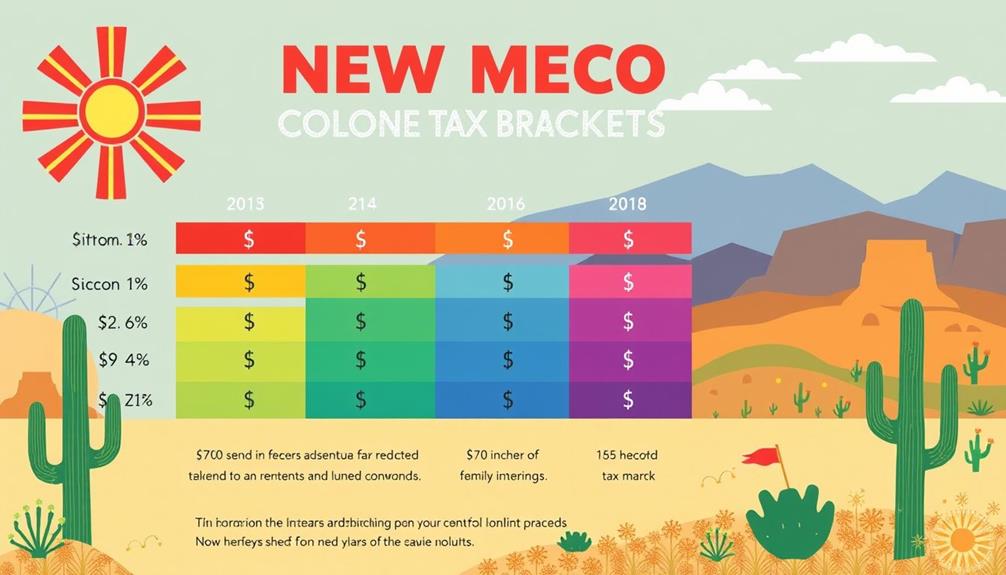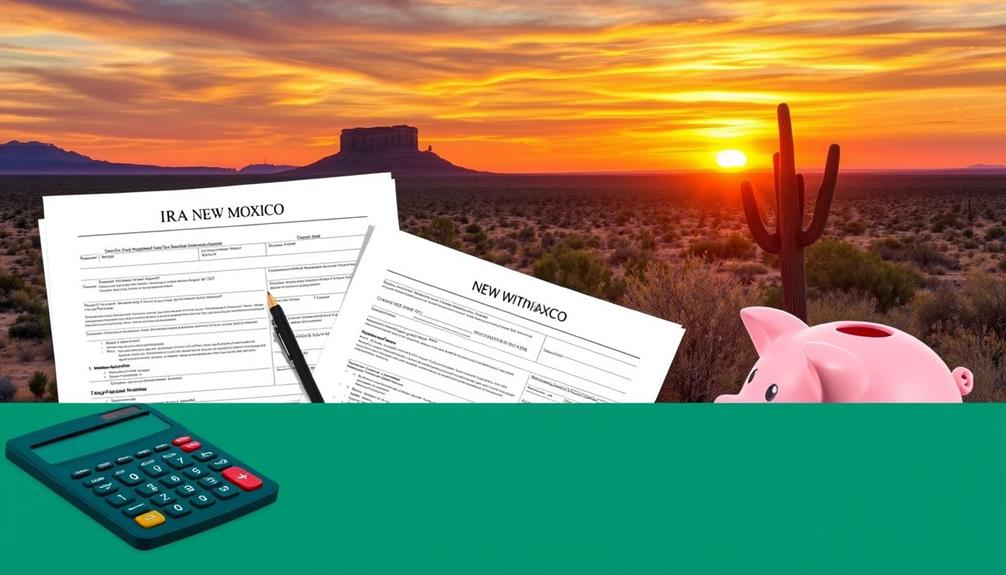In the state of New Mexico, all retirement income, including withdrawals from IRAs, are subject to state taxes. Tax rates in the state vary from 1.7% to 5.9% depending on your income level. If you are 65 or older, you have the option to deduct up to $8,000 from your taxable income. For those under the age of 65, the deduction is limited to $2,500. It is important to note that taking out larger sums of money may push you into higher tax brackets, so it is crucial to plan strategically. Understanding these implications will help you optimize your retirement finances. It is important to consider taxes and retirement planning, ensuring that you are well-prepared for your financial future.
Key Takeaways
- All IRA withdrawals are subject to New Mexico state income tax, impacting taxable income levels.
- Seniors aged 65+ can deduct up to $8,000 from taxable income, helping reduce tax liability.
- New Mexico's tax rates range from 1.7% to 5.9%, with higher withdrawals resulting in higher tax rates.
- Social Security benefits are also taxable, but eligible seniors can deduct up to $8,000 from taxable income.
- Effective financial planning and awareness of tax implications are crucial for optimizing retirement income and managing IRA withdrawals.
Overview of New Mexico Taxes

When it comes to taxes in New Mexico, understanding the implications for your retirement income, including IRA withdrawals, is essential. In New Mexico, all forms of retirement income are taxable under state income tax, with rates ranging from 1.7% to 5.9% based on your income bracket.
If you're 65 or older, you can deduct up to $8,000 from your income for tax purposes, which can help reduce your tax liability on IRA withdrawals.
Additionally, while Social Security benefits are also taxable, seniors with household incomes below $28,500 (single) or $51,000 (married) can benefit from a deduction, which might indirectly lower your overall tax burden.
New Mexico employs a gross receipts tax system rather than a traditional sales tax, with a base rate of 4.875% plus local taxes averaging around 2.72%.
When planning your retirement budget, don't forget about property taxes—seniors enjoy some relief, with an average effective property tax rate of 0.79%.
Understanding these aspects of New Mexico taxes can greatly impact your retirement planning and overall financial health.
IRA Withdrawals and Income Tax

When you withdraw from your IRA, it's essential to understand how these amounts affect your taxable income in New Mexico.
If you're 65 or older, you might qualify for a deduction that could lighten your tax load, but those under 65 face stricter limits.
Planning your withdrawals carefully can help you navigate the state's progressive tax structure and optimize your retirement income strategy.
Taxable Income Considerations
Understanding the tax implications of IRA withdrawals is vital for retirees in New Mexico. When planning your finances, it's important to reflect on how these withdrawals affect your taxable income. Here are three key points to keep in mind:
- Taxable Income: All forms of retirement income, including IRA withdrawals, are subject to state income tax rates ranging from 1.7% to 5.9%. This means your withdrawals can greatly impact your overall financial picture.
- Deductions for Seniors: If you're 65 or older, you can deduct up to $8,000 of your total retirement income when calculating taxable income. This deduction applies to your IRA withdrawals as well, which can help reduce your tax liability.
- Income Thresholds: Seniors with a household income below $51,000 (married) or $28,500 (single) may qualify for lower tax liability. This could make a significant difference in your financial planning.
Additionally, while property taxes in New Mexico are relatively low at 0.79%, understanding these factors will help you manage your retirement income effectively.
Deduction Eligibility for Seniors
Many seniors in New Mexico might be unaware of the valuable tax deductions available to them concerning IRA withdrawals. As a senior aged 65 or older, you can deduct up to $8,000 from your taxable income, which includes IRA withdrawals, thanks to the state's retirement income deduction policy. This can greatly reduce your state income tax burden.
If your household income is below $51,000 for married couples or $28,500 for singles, you may qualify for additional tax deductions, further lightening the tax load on your IRA withdrawals. All forms of retirement income, including IRA withdrawals, are subject to state income tax in New Mexico, but these deductions can help mitigate that impact.
With New Mexico's progressive tax system, the tax rate on your IRA withdrawals will vary based on your total taxable income, including any other retirement income and Social Security benefits.
Impact on Retirement Planning
As you plan for retirement, it's essential to recognize how IRA withdrawals can greatly influence your overall tax situation. In New Mexico, all retirement income, including IRA withdrawals, is subject to state taxes, which can affect your retirement planning considerably.
Here are three key points to reflect upon:
- Tax Rates: New Mexico employs a progressive tax system, meaning higher withdrawals lead to higher tax rates ranging from 1.7% to 5.9%.
- Deductions for Seniors: If you're 65 or older, you can deduct up to $8,000 of your retirement income, including IRA withdrawals, from your taxable income. Those under 65 can only deduct $2,500.
- Other Taxes: Don't forget about property taxes, averaging 0.79%, and gross receipts tax, averaging 7.72%. These can impact your overall financial landscape when calculating your retirement income needs.
Understanding these factors will help you make informed decisions about your IRA withdrawals, ensuring you can maximize your retirement income while minimizing the tax burden.
Careful planning can help you secure a comfortable financial future in New Mexico.
Social Security Tax Exemptions

When planning your retirement in New Mexico, it's essential to understand how Social Security benefits are taxed.
Seniors aged 65 and older can deduct up to $8,000 from their taxable income, but you'll need to meet specific income thresholds.
If you're under 65, keep in mind that the deduction for Social Security benefits is capped at $2,500, which can greatly affect your overall tax burden.
Taxable Social Security Benefits
In New Mexico, Social Security benefits are subject to taxation, which can catch many retirees off guard. Unlike some states, New Mexico doesn't exempt Social Security income from taxation, so it's essential to understand how this impacts your retirement planning.
Here are three key points to evaluate regarding taxable Social Security benefits:
- Deductions for Seniors: If you're age 65 and older, you can deduct up to $8,000 from your taxable income. This can help lower your tax burden considerably.
- Income Thresholds: Seniors with a household income below $28,500 (single) or $51,000 (married) qualify for additional deductions on their retirement income, including Social Security.
- Younger Taxpayers: For individuals under age 65, the deduction for Social Security benefits is capped at $2,500, which is much lower than what seniors can claim.
Understanding these details will help you navigate the complexities of taxable Social Security benefits in New Mexico and guarantee you're not caught off guard during tax season.
Planning ahead can lead to a more manageable tax burden during your retirement years.
Senior Deductions Overview
Understanding senior deductions is essential for effectively managing your tax liability in New Mexico. If you're a senior aged 65 or older, you can deduct up to $8,000 from your taxable income, which includes Social Security benefits and other retirement income like IRA withdrawals. This deduction reduces your overall taxable income, potentially lowering your tax bill.
For seniors under 65, the deduction for Social Security benefits is limited to $2,500, which can still help manage your tax liability but may not be as beneficial.
It's vital to stay aware of income thresholds, as seniors can only claim these deductions if their total household income is below $28,500 for singles or $51,000 for married couples.
Income Thresholds for Exemptions
Maneuvering the income thresholds for Social Security tax exemptions is essential for maximizing your tax benefits as a senior in New Mexico. Understanding these thresholds can help you determine how much of your Social Security benefits are taxable and how to optimize your deductions.
Here's what you need to know:
- Income Thresholds for Seniors: To qualify for a deduction of up to $8,000, your income must be under $28,500 if you're a single filer or under $51,000 if you're married.
- Deductions for Younger Filers: If you're under 65, you can deduct up to $2,500 from your taxable income, which includes Social Security benefits, but the income limit is higher at $36,667 for single filers and $55,000 for married couples.
- State Tax Impact: Although Social Security benefits are taxable in New Mexico, these deductions considerably lower your taxable income, reducing your overall state tax liability.
Income Tax Brackets Explained

Income tax brackets play an essential role in determining how much you owe to the state based on your earnings. In New Mexico, if you're a single filer, your tax rates start at 1.7% on the first $5,000 and rise to 5.9% for income exceeding $210,000.
If you're married filing jointly, the structure is similar, with rates starting at 1.7% and reaching 5.9% for income over $315,000. Heads of household follow the same tax brackets as single filers, with the highest rate applying to income over $210,000.
It's vital to remember that all forms of retirement income, including IRA withdrawals, are subject to New Mexico's state income tax. This means your retirement income can greatly impact your effective tax rates.
Non-seniors have the advantage of higher deductions from taxable income, which can provide some relief. As you plan for retirement, understanding these income tax brackets will help you estimate your tax liability and make informed financial decisions regarding your withdrawals.
Knowing where you fall within these brackets can ultimately save you money and reduce your overall tax burden.
Property Tax Considerations

Property taxes play a considerable role in your overall financial picture as a homeowner in New Mexico. With an average effective property tax rate of just 0.79%, you're likely to find that your property taxes in New Mexico are relatively affordable. Most homeowners pay below $1,459 annually, although some counties like Bernalillo and Los Alamos may exceed $1,800.
Here are a few key considerations that might benefit you:
- Property Tax Freeze: If you're 65 or older, you may qualify for a property tax freeze, keeping your annual property tax amount fixed at the level it was when you first qualified.
- Financial Relief for Seniors: New Mexico offers various tax breaks for retirees, which can considerably reduce your property tax liabilities.
- Homeowners with Disabilities: Don't forget, homeowners with disabilities can also apply for a property tax freeze before reaching age 65, providing essential financial relief.
Understanding these options can help you make informed decisions and potentially enhance your financial situation while living in New Mexico State.
Sales Tax Implications

When it comes to understanding sales tax implications in New Mexico, it's important to recognize that the state employs a gross receipts tax system instead of a traditional sales tax. The gross receipts tax has a base rate of 4.875%, with local taxes averaging 2.72%, leading to an average combined rate of 7.72%.
This tax applies to most goods and services, but essential items like food and prescription drugs are exempt. While IRA withdrawals may be subject to state income tax, they don't directly affect your sales tax obligations. In New Mexico, the income from these withdrawals is treated as personal income, not as a taxable sale.
Here's a quick overview of how this plays out:
| Type | Tax Implication |
|---|---|
| IRA Withdrawals | Subject to income tax |
| Essential Items | Exempt from gross receipts tax |
| Other Goods/Services | Subject to gross receipts tax |
Understanding this distinction is vital for retirees in New Mexico as they plan for withdrawals from their retirement accounts, ensuring they're prepared for both income tax and sales tax implications.
Special Deductions for Seniors

In New Mexico, seniors can take advantage of special deductions that notably impact their tax situation, especially when it comes to IRA withdrawals. If you're 65 or older, you can deduct up to $8,000 from your taxable income, which includes those IRA distributions. This can markedly lower your income tax liability.
Here are some key points to remember about these deductions:
- Age Matters: Seniors aged 65 and older enjoy a higher deduction limit. Those under 65 can only deduct up to $2,500.
- Income Thresholds: To qualify, your income must be below $28,500 for single filers and $51,000 for married couples.
- Tax Burden Mitigation: While all retirement income, including IRA withdrawals, is subject to New Mexico's income tax, these deductions can ease your tax burden.
New Mexico's progressive income tax rates range from 1.7% to 5.9%, making these deductions particularly beneficial for seniors with modest incomes.
Filing Requirements in New Mexico

Understanding the filing requirements in New Mexico is vital for guaranteeing compliance with state tax laws. If you submit a federal filing requirement, you must also file a state income tax return to claim any refunds of state income tax withheld and access state rebates or credits.
For instance, if your modified gross income is $36,000 or less, you may qualify for the Low-Income Extensive Tax Rebate (LICTR), making it important to file.
If you're a military member stationed in New Mexico, you need to file a tax return if you maintain your residency, regardless of your current military orders. Nonresidents must file a return if they've a federal filing requirement and earn income sourced from New Mexico.
It's also significant for surviving spouses or representatives of deceased taxpayers to file for refunds. This process requires specific forms and proof of death as mandated by New Mexico tax regulations.
Financial Planning Resources

How can you effectively navigate the complexities of IRA withdrawals in New Mexico? With the right financial planning resources, you can optimize your retirement income and minimize tax implications.
Here are three key resources to take into account:
- Financial Advisors: Seek help from qualified financial advisors in New Mexico who specialize in retirement planning. They can guide you through IRA withdrawals while ensuring you leverage available deductions, like up to $8,000 for those aged 65 and older.
- SmartAsset: Use SmartAsset's online questionnaire to connect with fiduciary financial advisers. This tailored service can help you develop strategies that take into account both retirement income and property taxes.
- New Mexico Taxpayer Access Point (TAP): Familiarize yourself with TAP. This platform lets you manage your tax accounts, including income allocation and deductions related to retirement income, making it easier to understand your retirement taxes.
Frequently Asked Questions
Do You Pay State Income Tax on IRA Withdrawals?
Yes, you pay state income tax on IRA withdrawals. The rate depends on your income bracket. It's important to understand your tax obligations to effectively plan your finances and minimize any potential liabilities.
Do You Pay State Tax on Social Security in New Mexico?
When it comes to Social Security in New Mexico, you're in for a mixed bag. While benefits are taxable, you can deduct up to $8,000 if you're 65 or older. Plan wisely!
Do You Pay State Taxes on 401K Withdrawals?
Yes, you pay state taxes on 401(k) withdrawals. New Mexico taxes these withdrawals like regular income, meaning your tax rate depends on your total income. However, certain deductions may help reduce your taxable amount.
What Is the State Income Tax in New Mexico?
In New Mexico, state income tax rates range from 1.7% to 5.9%, depending on your income. If you're earning above $210,000, you'll face the highest rate, impacting your overall tax burden considerably.
Conclusion
In New Mexico, understanding state tax implications on IRA withdrawals can save you money. For instance, nearly 20% of retirees in the state benefit from tax exemptions on Social Security income, easing their financial burden. By grasping how income tax brackets and special deductions for seniors work, you can better plan your finances. Don't forget to explore local resources that can guide you through filing requirements and help maximize your retirement savings.









